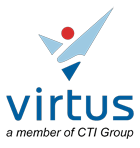Private cloud has become the most sought-after service in today's evolving digital landscape, providing a dedicated cloud environment for sensitive data and critical applications. Unlike the public cloud, the private cloud ensures exclusive control and customization, helping organizations design an infrastructure that meets the unique needs of their business.
The flexibility of a private cloud allows businesses to seamlessly expand, ensuring optimal performance and eliminating concerns about downtime or resource constraints. Now, to maximize the benefits of private cloud, organizations must implement key strategies to build the right private cloud infrastructure.
However, what steps can organizations take to design a flexible and secure private cloud infrastructure? Read more in this Virtus article.
What is Private Cloud?

Private cloud is a cloud computing environment where all hardware and software resources are fully dedicated to a single user. Private cloud combines the benefits of cloud computing, such as elasticity, scalability, and ease of service delivery, with the access control, security, and customization of resources in on-premises infrastructure.
Private cloud is very popular and is chosen by many organizations because it is the only cloud service that helps them meet existing regulatory compliance requirements. In addition, private cloud is able to securely maintain important files, intellectual property, personal identity information, financial data, or other sensitive data. Interestingly, private cloud architecture allows organizations to move and run workloads in the public cloud or hybrid cloud as needed.
How Does Private Cloud Work?
Private clouds operate similarly to other cloud computing environments, but with some differences that make them more exclusive and controllable. A private cloud is entirely dedicated to a single customer or organization, which means that all computing resources, such as servers, storage, and networks, are accessible only to that customer, allowing for strict protection of the data and applications within it.
In addition, private cloud management can be done by the customer or by the chosen service provider. Some organizations choose to manage their own resources for complete control, while others rely on providers to manage and monitor their cloud infrastructure.
In terms of security and control, private cloud provides a higher level of security and control by implementing data encryption, access rights management, and network traffic monitoring. A private cloud also provides scalability to increase or decrease capacity as needed.
4 Benefits of Private Cloud
By using a private cloud, organizations can experience the amazing benefits of cloud computing without sacrificing security, control, and customization. Here are four additional benefits of a private cloud.
1. Full Control Over Device Selection
Private cloud users are free to use the hardware and software they want, without having to follow the cloud provider's offerings or choices.
2. Free Device Adjustment
Private cloud users can customize servers and software as needed with add-ons or custom development.
3. Full Visibility
Greater visibility into security and access control because all workloads run inside the user's firewall.
4. Compliance
Private cloud users can enforce compliance to the standards they set.
How to Design Private Cloud Infrastructure?
Basically, private cloud infrastructure uses the same technology as other cloud computing, namely virtualization, software management, and automation. These three technologies allow users to quickly and easily provision and configure virtual servers and computing resources as needed. They also automatically improve response to usage and traffic spikes, implement redundancy for high availability, and optimize overall resource utilization.
In addition, private cloud users can adopt cloud-native application architectures and practices, such as DevOps, containers, and microservices, which can provide greater efficiency and flexibility. This also enables a seamless transition to a public cloud or hybrid cloud environment.
If you are now interested in using or even designing a private cloud infrastructure, Virtus has the right recommendations to make your plans easier. A combination of three trusted IT solution providers – Dell PowerFlex, Red Hat OpenShift and Trend Micro Cloud One – can help make your enterprise cloud journey a success.
Private Cloud Solutions from Dell PowerFlex, Red Hat OpenShift and Trend Micro Cloud One
The combination of Dell PowerFlex, Red Hat OpenShift and Trend Micro Cloud One can provide a powerful and secure solution to the need to design and implement a secure, elastic and efficient private cloud infrastructure. This combination enables organizations to take advantage of the benefits of cloud computing with the greater control and isolation required for sensitive applications and data.
Dell PowerFlex provides flexible and scalable storage capabilities, Red Hat OpenShift provides a unified platform for containerized applications, and Trend Micro Cloud One focuses on delivering accurate and simple cloud security solutions. This integrated approach can help organizations achieve greater efficiency, agility, and security in IT operations.
Freedom to Deploy & Scale with Dell PowerFlex
Dell Technologies' PowerFlex hyperconverged platform integrates compute, storage, and networking into a single solution, making it easy to design and manage a private cloud infrastructure.
With PowerFlex, you can aggregate and manage storage resources from different hardware, then abstract and present them as a single storage pool. This pooling provides greater agility in scaling storage resources so that they can be customized with storage capacity and performance as needed.
PowerFlex is designed with scalability in mind, so you can easily add or reduce resources as needed, in line with key private cloud characteristics. Other benefits of PowerFlex include
Ease of use and management
Operational efficiency and reduced complexity
Easy scalability for business growth
Red Hat OpenShift Unified Platform for Business Applications
OpenShift is a container platform from Red Hat. It is designed to help enterprises deploy, manage, and scale containerized applications. Containers provide a lightweight and consistent environment for running applications, making it easier to develop, deploy, and manage applications across multiple cloud environments.
OpenShift is built on top of Kubernetes and includes additional features for security, scaling, monitoring, and automation. OpenShift also provides a multi-cloud platform for different infrastructure environments, such as on-premises, private cloud, public cloud, and hybrid, with the following benefits
Consistent and rapid application management
Infrastructure agility in multi-cloud environments
Enhance team collaboration in application development
Clarity & Simplicity Security from Trend Micro CloudOne
CloudOne is a security platform from Trend Micro that focuses on providing security solutions for cloud environments. We know that cloud security is an important aspect of modern IT operations, as more and more businesses are adopting cloud services for applications and data storage.
CloudOne aims to simplify the management of security for cloud-based resources. It includes features such as threat detection and prevention, compliance monitoring, data protection, and vulnerability management.
By providing a comprehensive and easy-to-use interface, CloudOne can simplify the complex task of securing cloud infrastructure and applications, ensuring that both are protected from various cyber threats.
Interestingly, CloudOne's integrated protection for cloud applications and infrastructure is also suitable for small businesses, such as MSMEs, with the following benefits
Comprehensive cloud application and infrastructure protection
Proactive protection against cyber threats
Real-time security monitoring for complete visibility
Join the Virtus Expert Team to Design a Flexible and Cyber Secure Private Cloud Infrastructure
It's time to build a secure, efficient and innovative private cloud infrastructure using a combination of Dell PowerFlex, Red Hat OpenShift and Trend Micro Cloud One solutions. Specifically designed by three leading and trusted IT service providers to create a cloud environment that supports business growth and scalability.
Virtus Technology Indonesia (VTI), as an authorized partner of Dell, Red Hat, and Trend Micro, will help organizations implement this combination quickly and securely. Virtus' experienced, certified, and competent IT team ensures all processes from consulting, deployment, management, and after-sales support.
Discuss your business needs with Virtus today. For more information on Dell PowerFlex, Red Hat OpenShift, and Trend Micro Cloud One, contact our team by clicking here.
Author: Wilsa Azmalia Putri
Content Writer of CTI GROUP




























